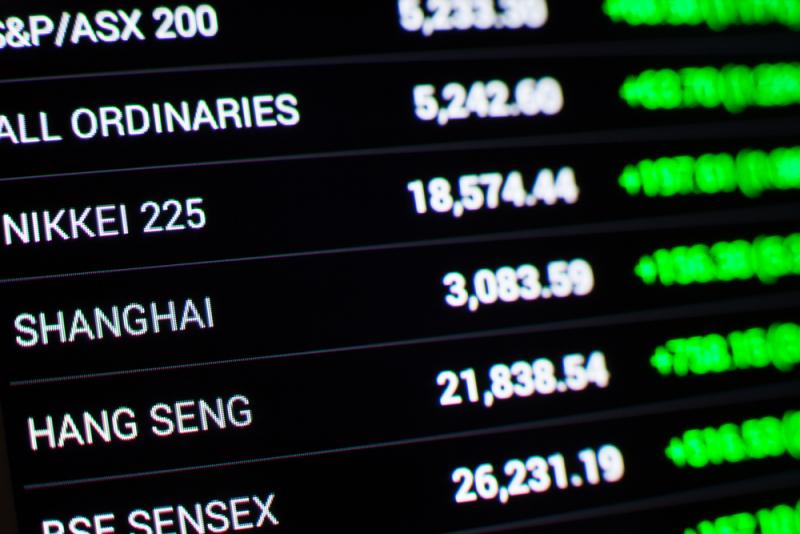
Markets in Asia closed lower on Monday as Chinese leaders headed into an annual parliament meeting while in Italy, exit poll projections indicated that no party is emerging with a clear majority in Sunday’s election.
Japan’s Nikkei 225 fell 0.66 percent to close at 21,042.09, marking its fourth straight session of losses. Monday’s declines also saw the Nikkei touch its lowest levels since October. The Topix index ended down 0.79 percent. Across the Korean Strait, the Kospi closed lower by 1.13 percent.
Chinese mainland markets reversed early losses to close slightly higher, with the Shanghai composite finishing up 0.09 percent. The Shenzhen composite wavered between gains and losses to close higher by 0.47 percent. Meanwhile, the ChiNext start-up board climbed 1.2 percent to outperform the benchmark.
China’s National People’s Congress meeting kicked off on Monday morning, with Premier Li Keqiang announcing a 2018 growth target of around 6.5 percent. For the next two weeks, the large rubber-stamp parliament will move on to pass major bills, approve the budget and endorse personnel nominations.
Defense stocks listed on the mainland got a slight boost after it was announced that China would increase its military budget by 8.1 percent, with Avicopter up 1.58 percent.
In Hong Kong, the Hang Seng index declined 1.42 percent by 3:00 p.m. HK/SIN, with large cap financials leading losses an hour before the market close.
Down Under, the benchmark ASX 200 fell 0.57 percent to close at 5,895, its lowest levels since the middle of last month. The heavily-weighted financial sub-index finished the day down 0.73 percent and material stocks lost 1.13 percent.
Australian banking names mostly fell: Shares of Commonwealth Bank declined 0.92 percent and Westpac was down 1.24 percent. Major mining stocks were also lower, with Fortescue losing 3.26 percent by the end of the day.
The session in Asia followed a mixed finish at Wall Street on Friday as investors remained focused on President Donald Trump’s announcement last week that he would introduce tariffs on steel and aluminium imports.
Vishnu Varathan, head of economics and strategy at Mizuho Bank, wrote in a Monday morning note that the jury was still out until Trump signed off on the tariffs and revealed more details.
“Escalation in U.S.-Eurozone rhetoric on retaliatory measures heighten risks of cross-Atlantic trade wars,” Varathan wrote. “Especially after Trump’s trade adviser Navarro ruled out exemptions; potentially alienating allies like Canada, Japan, EU, UK and South Korea.”
The “scope for knock-on impact across Asia, while mixed, is undeniable,” he added.
No clear majority in Italian election
As of Sunday night local time, Italian exit poll projections indicated that a center-right bloc will gain the most seats in parliament.
Elsewhere, Germany’s Social Democrats backed another coalition deal with Chancellor Angela Merkel’s conservatives on Sunday, Reuters reported. That would allow Europe’s largest economy to form a new government and mitigate political uncertainty.
The euro edged lower in the afternoon, trading at $1.2288 at 2:47 p.m. HK/SIN. The common currency advanced from levels below $1.2180 — reached in the previous week — to as high as $1.2365 on Monday.
Analysts said the bounce in euro was due to the news out of Germany.
“The gains were, however, quickly returned as reality sank in that German leadership has weakened with many challenges lying ahead for Merkel,” Philip Wee, a foreign-exchange strategist at Singapore’s DBS Bank, wrote in a morning note.
He added that as Italy’s political parties work to try and form a government, the euro will “likely lose support.”
Dollar steady
The greenback traded sideways on Monday against a basket of currencies, with the dollar index at 90.063 at 2:48 p.m. HK/SIN.
The index fell from levels above 90.500 in the previous week, following concerns over a potential trade war following Trump’s tariff announcement.
“A full-scale trade war is not good for global growth and risk sentiment,” Rodrigo Catril, a senior foreign-exchange strategist at the National Australia Bank, wrote in a note.
He explained that trade tariffs would likely be inflationary and may invite the risk of retaliation from U.S. trading partners. He added that the reaction from China and other U.S. trading partners to an official trade tariffs announcement will be important.
“For currencies the initial reaction to U.S.-led trade tensions is a negative for the dollar,” Catril said. “But we think that an escalation of these tensions will result in a differentiation between safe haven currencies and currencies from small open economies.”
He added that the Australian dollar, Canadian dollar, New Zealand dollar and emerging market currencies were “unlikely to be winners” under such a scenario.
Among currency majors, the yen traded at 105.49 to the dollar, strengthening from levels above 107 in the previous week.
The Japanese currency firmed on Friday after Bank of Japan Governor Haruhiko Kuroda indicated the central bank would think about exiting easy monetary policy if inflation targets are met in fiscal 2019.
Major exporters in Japan declined on the back of the firmer yen. Shares of Toyota fell 1.47 percent, Honda was down 2.12 percent and Sony slipped 0.13 percent. A strong yen is usually a negative for exporters as it reduces their overseas profits when converted into the local currency.
The Australian dollar traded at $0.7738, while the British pound fetched $1.3782.
Oil prices traded higher on Monday, with U.S. crude up 0.23 percent at $61.39 a barrel while global benchmark Brent rose 0.31 percent to $64.57.

